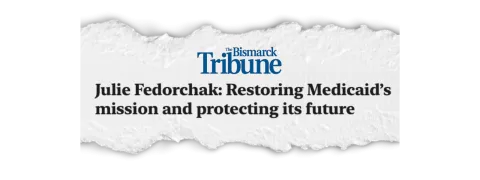Restoring Medicaid’s mission and protecting its future
Bismarck, ND — In a new op-ed, Congresswoman Julie Fedorchak (R-ND) highlights how reforms included in the recently enacted One Big Beautiful Bill strengthen Medicaid and restore the program to its original mission. She emphasizes how North Dakota is well-positioned to implement these commonsense reforms and how coverage for most North Dakotans will remain unaffected.
When it comes to health care programs like Medicaid, North Dakotans deserve clarity—not fear.
Unfortunately, the media has sown a lot of fear and spread a lot of misinformation about the Medicaid reforms in the recently enacted One Big Beautiful Bill, leaving many people worried about cuts that simply don’t exist.
So, let’s set the record straight.
Medicaid is a critical program. I’ve heard from people across our state who rely on it to care for aging parents, children and adults with disabilities, or expectant mothers in need.
This landmark bill honors those needs. It strengthens Medicaid by restoring the program to its original mission: caring for the most vulnerable—seniors, people with disabilities, and low-income pregnant women—while cracking down on waste, fraud, and abuse.
The truth about the changes is this: we will spend more on Medicaid tomorrow than we do today.
Under this law, Medicaid spending is set to increase by 25 percent over the next 10 years. That’s a significant investment to ensure the program works better and remains available to those who need it most.
It also includes a new $50 billion Rural Hospital Fund to help states like North Dakota strengthen care in small towns—supporting telehealth, emergency services, mental health care, and the recruitment of doctors and nurses.
For a rural state like ours, that means more local control, more flexible tools, and better outcomes for the communities that often struggle most to access care.
We implemented two important Medicaid reforms in the One Big Beautiful Bill.
First, the bill requires Medicaid enrollees to verify eligibility twice a year, helping states remove people who no longer qualify or who are abusing the system.
Second, we require able-bodied adults ages 19 to 64 who qualify for Medicaid to complete 20 hours per week of “community engagement” requirements. This can be fulfilled through work, school, or volunteering—whichever best fits someone’s life circumstances.
Importantly, we approved a sizeable list of exemptions from the work requirements. They don’t apply to seniors, people with disabilities, pregnant women, caregivers, and individuals recovering from addiction or incarceration, among others.
More than half of North Dakota’s Medicaid recipients are seniors in long-term care—meaning they are not affected at all by the community engagement requirements established in the One Big Beautiful Bill.
According to KFF data, 72 percent of Medicaid-covered adults in North Dakota already work full- or part-time. Only around 10 percent fall into the category of able-bodied adults aged 19–64 who may need to meet the new community engagement requirements.
I have yet to meet a North Dakotan who doesn’t support these reforms when they are clearly explained. These are common sense reforms intended to protect taxpayer dollars while prioritizing care for the truly vulnerable.
North Dakota is already ahead of the curve. Our state manages Medicaid efficiently and compassionately. We are well-positioned to implement these reforms—and we should be proud of that.
At the end of the day, these policy changes are about making Medicaid work better.
By restoring accountability and focusing resources where they’re needed most, we can make sure the program is strong and sustainable for generations to come.
That’s what good governance looks like. And that’s what I’ll keep working for—because North Dakotans deserve nothing less.
